1/19/1809 - Beginning a tragic life that will only last forty years, future writer, poet, editor, and literary critic, the legendary Edgar Allan Poe, is born to American actor David Poe Jr. (his grandfather, David Poe, emigrates to America in 1750 from County Cavan, Ireland) and English born actress Elizabeth Arnold Hopkins Poe in Boston, Massachusetts.
Poe - 1849
Bad times begin early for Poe ... in 1810 his father abandons his family (Poe will have an older brother, William, and a younger sister, Rosalie) and in 1811, his mother dies from consumption (pulmonary tuberculosis) at the age of twenty-four. Following Elizabeth's death, young Edgar is taken in by the family of a friend of his mother, a wealthy Richmond, Virginia merchant (he dabbles in cloth, wheat, tombstones, tobacco, and slaves) named John Allan and his childless wife, who will alternately spoil and harshly discipline the youth. A foster family of sorts, the Allans will never formally adopt Poe as their own, but they do give him his middle name of Allan, see that he is baptized into the Episcopal Church in 1812, provide food and a roof over the future writer's head, and give him a base for the classical education he receives in Virginia, and between 1815 and 1820, schooling in England and Scotland. Returning to America, in 1824, Poe serves on a youth honor-guard that welcomes Revolutionary War hero, the Marquis de Lafayette, to the city of Richmond. Already well off, the Allan family becomes even wealthy in 1825, when Allan's uncle and business benefactor dies and leaves real estate and money to his nephew ($750,000 which today would have a market value of $18 million). Considered a fine young prospect, before beginning his matriculation at the University of Virginia studying ancient and modern languages, in 1826, Poe becomes engaged to Sarah Elmira Royster (neighbors, the relationship begins in 1825 when Poe is sixteen and Royster is fifteen).
Royster
A relatively new university in 1826, started by Thomas Jefferson, with strict rules about gambling, horse races, guns, tobacco, and alcohol, Poe takes only a year to run afoul of the college's rules, estranges his foster father with demands for money and his gambling debts, and is horrified to discover that in his absence from home, Royster has married a man named Alexander Shelton. Feeling unwelcome back in Richmond, Poe transplants to Boston in April of 1827 using the name Henri Le Rennet as he tries to make ends meet laboring at the jobs of clerking and writing for a local newspaper. Unable to sustain himself with the work he finds available, claiming to be 22 when he is actually 18-years-old, using the new pseudonym of Edgar A. Perry, Poe enlists for five years in the United States Army on May 27, 1827 and begins his military career as a private at Fort Independence in Boston Harbor, earning a whole five dollars a month. As part of his regiment, at the end of the year the writer is next stationed at Fort Moultrie in Charleston, South Carolina where he is promoted to "artificer" (an enlisted tradesman who readied shells for the artillery) and has his salary doubled. Transferred to Fortress Monroe at the entrance to the Chesapeake Bay, not happy with the work (despite attaining the rank of Sergeant Major for Artillery, the highest rank that a non-commissioned officer could attain at the time), after two years of overseeing the priming of shells, Poe decides to get out of his remaining three years of service by jumping even deeper into military service by furthering his education at West Point, New York's United States Military Academy. Confessing his subterfuge to his commanding officer, Lieutenant Howard agrees to release Poe if he can reconcile with Allan and provides a substitute to finish the three years of service he owes the army. Substitute found (his own service over, a friend of Poe's from his days of artillery duty, Sergeant Samuel "Bully" Graves, agrees to take Poe's place for $75, but only receives $25 of the agreed to total) Poe eventually gets Allan to support his plans to become an officer (Allan appears to soften after the death of his wife in 1829, but the men's reconciliation is brief). Before leaving for West Point in 1830, Poe moves back to Baltimore for fifteen months of readying himself for the challenges of university life and doing more writing (a published author by this time of a 40-page book of poetry entitled "Tamerlane and Other Poems" by a "Bostonian," before going off to West Point he has a second book of poetry published in 1829 called "Al Aaraaf, Tamerlane and Minor Poems"), staying at the home of his widowed aunt, Maria Clemm, her daughter and his first cousin, Virginia Eliza Clemm, his brother, Henry, and his invalid grandmother, Elizabeth Carnes Poe.
Fort Independence
Fort Moultrie
Virginia Clemm
At West Point, though Poe is good in his classroom subjects (especially French) and popular with the other cadets (his witticisms and poems make the way about the school on an almost daily basis), the writer once again chaffs at the military academy's disciplinary rules (he also can't stand the college's notorious long marches and stomach churning foods) ... and continues to war with Allan over money issues and gambling debts (he also questions Allan's choice of a second wife and pricks the man's guilt over the children he has produced out of wedlock) to the extent that his foster father sends him a letter noting his embarrassment (motivated in part by a letter Sgt. Graves sends Allan requesting he make good on Poe's debt of $50), disowning him, and wanting no further discourse with the youth. And Poe reacts extremely poorly to Allan's cord cutting, deciding to double-down on his foster father's embarrassment by getting expelled from the academy. His plan put in motion (his two roommates at West Point, Thomas W. Gibson of Indiana and Timothy Pickering Jones of Tennessee will also be kicked out of the school), between July of 1831 and December of the same year, the cadet accrues 44 offenses worth 106 demerits, before becoming even more undisciplined with the start of 1832, receiving during the month of January 66 more offenses, as he becomes a mythic rule breaker that skips classes less than he attends them, is constantly drunk, and even shows up for formation in his birthday suit. Successfully failing (he delights in letting his fellow cadets believe he is the grandson of Benedict Arnold), Poe is court-martialed for gross neglect of duty and disobedience of orders for refusing to go to class, attend formations, or attend church on Sundays, and found guilty, is sent packing, leaving West Point on February 19, 1832, but not before receiving donations from fellow cadets to publish a third volume of his poetry (his subscribers give seventy-five cents and Poe takes away a total of $170 from the academy), but it is another flim-flam from the 22-year-old, when the book comes out it is mostly filled with already published poems (expecting works mocking West Point and it's instructors, the cadets are not happy when they receive "Poems" and many will toss the work into the waters of the nearby Hudson River).
West PointBack in Baltimore after finding a publisher for his poems, Poe takes the death of his older brother on August 1, 1831 as a sign that he should become serious about his writings. Prose instead of poems his writing for the time being, Poe spends time rotating between Baltimore, New York City, Philadelphia, and Richmond, writing, seeking publishers for his stories, and working for literary journals and periodicals as an editor and literary critic. He also finds time to fall madly in love with his 13-year-old cousin (he is 26!), Virginia Clemm. In 1835, he receives a license to marry the youngster and on September 22, 1835 (a witness will falsely testify to Virginia's age as being 21), the pair will begin a wedded life that lasts 11 years, ending on January 30, 1847, when she dies in Bronx County, New York, with Poe and her mother by her side, of tuberculosis at the age of only 24 (the first signs of the disease show up in 1842 when Virginia is singing and playing the piano and starts bleeding out of her mouth). During this period in time, Poe will also be fired from his job as assistant editor at Richmond's Southern Literary Messenger for showing up for work drunk (he will win the position back with promises to remain sober), has his novel, "The Narrative of Arthur Gordon Pym of Nantucket" (about the adventures of a stowaway on a whaler, it is considered to be an inspiration for Herman Melville's "Moby Dick"), published in 1838, has his "Tales of the Grotesque and Arabesque" published in 1839 in two volumes (Volume 1 contains "The Fall of the House of Usher") while holding down an assistant editor job with Burton's Gentleman's Magazine (a Philadelphia monthly magazine), and next becomes a writer and co-editor of the already successful Philadelphia monthly, Graham's Magazine (during his stint working for George Rex Graham, Poe will write and have published in the magazine "The Murders in the Rue Morgue," considered to be the first modern detective novel, and "The Mask of the Red Death"). In 1840, he tries to start his own monthly in Philadelphia, called The Stylus (he originally calls the magazine The Penn), but for lack of funds the project falls apart before any issues make it into print (in 1842, Poe's "Pit and the Pendulum" is published, as is his tale of murder and madness, "The Tell-Tale Heart"). Seeking a steadier income than his writings provide (in 1843 he wins a prize of $100 from the Philadelphia Dollar Newspaper for writing "The Golden Bug" ... it is also the year that sees the publication of "The Black Cat" in the Saturday Evening Post), Poe attempts to secure a position within the Whig administration of President John Tyler at the Philadelphia United States Custom House, but experiences another failure by missing an interview for an open position (he will claim he has a cold, others will insinuate his drinking has done him in again).
Graham
President Tyler
Fame without the fortune, on January 29, 1845, the New York Evening Mirror publishes what will become Poe's most well known work, the narrative poem, "The Raven" (for which Poe will be paid a miserly $9). Soon other publications also publish the poem and Poe becomes somewhat of a national celebrity. But soon, he is again forced to deal with failure and loss. After Poe takes over the New York City based Broadway Journal in June of 1845, based on lack of sales and alienated other writers by publicly accusing Henry Wadsworth Longfellow of plagiarism, the journal goes bankrupt and shuts down after publishing its final issue on January 3, 1846 (Poe's caustic reviews of the writings of others will earn him the sobriquet, the "tomahawk man"). And things go rom bad to worse when he moves into a cottage with his ailing wife near what will become Fordham University. There, a year later, on January 30, 1847, Virginia passes away (during her final period of illness, Virginia will also unwittingly supply another body blow to the writer, when she shows her love a letter written by Louisa Patterson, his foster-father's second wife, in which the woman admits to purposely causing the rift between the two men) and a depressed Poe once more tries to escape his bitterness with life by hitting the bottle (getting hammered on his favorite drink, brandy eggnog) ... hard. And it doesn't help his deposition at all that hours after Virginia dies, a distraught Poe realizes that he has no image of his love and commissions a watercolor portrait of his wife that is painted using Virginia's corpse as the model for the work (now in the possession of the family of Virginia's half-sister Josephine, the wife of Neilson Poe). Finally able to begin functioning again, in the last years of his life, Poe will continue to write poems, short stories, critiques, and essays (though nothing as memorable as "The Raven" or "The Tell-Tale Heart, his lecture "Eureka," a transcendental explanation of the universe is considered a masterpiece by some scholars, and pure nonsense by others), relocates to Providence, Rhode Island to court poetess Sarah Helen Whitman (there is a brief engagement that soon ends because of his continued drinking), has intense platonic relationships with Annie Richmond, young poetess Susan Archer Talley, and Sarah Anna Lewis, and with a return to Richmond, renews his interest in the now the widow, Mrs. Shelton, his former sweetheart, Elmira Royster.
The Fordham Cottage
Virginia's Bedroom
The real-life mystery surrounding Poe's death, begins a week before his demise, when, on September 27, 1849, he leaves Richmond headed north, to take care of editing a volume of poetry by Philadelphia poetess Marguerite St. Leon Loud and to make arrangements in New York City to close down his home there and officially move back to Richmond, where he intends to make Elvira his bride. Unknown as to why, he instead shows up in Baltimore, Maryland and never leaves the city. On October 3, 1849, a cold and wet Wednesday election day in the city (for Congress and the state's House of Delegates), Joseph W. Walker, a typesetter for the Baltimore Sun, finds a delirious man dressed in shabby, second-hand clothing, laying in the gutter outside a public house called Gunner's Hall that includes a drinking establishment known as Ryan's Tavern (the site is the polling place for the city's 4th Ward). Recognizing the man as the writer, Edgar Allan Poe, Walker gets the briefly lucid 40-year-old to give him the name of someone in Baltimore that might come to his assistance, and so a note is sent to Joseph E. Snodgrass (Snodgrass describes Poe as being the "worse for wear," "in great distress," and "in need of immediate assistance"), a magazine editor friend of Poe's with a modicum of medical training. A few hours later, Snodgrass and Poe's uncle-in-law, Henry Herring, show up at Ryan's Tavern, put the poet in a buggy and take him to the nearby Washington College Hospital where he is placed in a prison-like barred window room in a section of the building usually reserved for drunks, under the care of hospital's resident, 29-year-old Dr. John Joseph Moran (who bans visitors from seeing the ailing Poe and spends the rest of his life talking about Poe's last days, changing his tale repeatedly). In a state of fevered delirium, hallucinating, unable to answer the simplest of questions as to what has occurred (according to his doctor, when told he will soon be well and enjoying the company of friends, Poe responds by stating, "... the best thing a friend could do was to blow out his brains with a pistol ..."), calling out the name Reynolds (no one can ever identify who this individual is), asking after his wife in Richmond (his wife is dead and he has yet to marry Elvira, though she has accepted his proposal) and wanting to know what has happened to a trunk of his belongings (it will later be located in a Richmond tavern), the writer finally perishes after five days at the hospital from what Dr. Moran will call phrenitis, a swelling of the brain, at 5:00 in the morning of October 7, 1849. According to Moran, Poe's last words are, "Lord help my poor soul." Gone, but then the questions that can't be answered as to the cause of death begin (all medical records and documents relating to the death, including Poe's official death certificate are now lost).
Poe A Month Before His Death
Washington College Hospital
Among the many theories as to the cause of Poe's death that surface, there will be admirers and haters that believe he perishes after being beaten by Baltimore ruffians and robbed, that the writer is roughed up enough to die after being grabbed by a cooping gang (thugs hired to elect a political candidate that do so by having their victims vote more than once after name changes and changes in wardrobe ... and he is found right next to a polling site on an election day in ill-fitting clothing), his alcohol imbibing got the better of him (he is said to become a roaring drunk after a single glass of wine or champagne, let alone hard liquor, but the problem is that Poe, readying for his upcoming wedding, has joined a temperance society and has vowed never to drink alcohol again ... and testing of his hair when his body is moved years later proves he made good on his pledge), he accidentally poisons himself writing in a closed environment that accumulates toxic levels of carbon monoxide (again, his hair will not bear out this theory), mercury poisoning brought on by doses of mercury calomel taken during a cholera epidemic that hits Baltimore in the summer of 1849 (again, Poe's hair says "GO FISH!"), his hallucinates and fever are brought on by a fatal case of rabies, he is done in by a brain tumor no one knows about, he takes ill and succumbs to a bad case of the flu, he is murdered by members of the Shelton family that don't want the poet marrying their sister, Elmira, and there is talk of the death being the result of Poe having an epileptic attack, dying from syphilis, another theory has him dying of hypoglycemia (low blood sugar), medicating his pains with too much laudanum, and there are claims the death comes from an enzyme deficiency, apoplexy, delirium tremens related to his drinking, and a case of meningeal inflammation. No one knows!
Memorial Plaque
What is known is that Poe's funeral takes place on October 8, 1849 at 4:00 on a drearily cold Monday afternoon in Baltimore at the Westminster Presbyterian churchyard. Officiated by Reverend W. T. D. Clemm (who decides not to give a sermon seeing how few people are on hand), the cousin of Poe's wife, Virginia, and is attended by Poe's uncle, Henry Herring (who supplies the funds for the writer's simple mahogany casket which lacks handles, any nameplate, clothing lining, and a pillow for Poe's head to rest upon, the shroud covering the coffin is sewn by Dr. Moran's wife), his cousin, Neilson Poe (who supplies the hearse), Snodgrass, former University of Virginia classmate and friend, Baltimore lawyer Zaccheus Collins Lee, Poe's first cousin, Elizabeth Herring and her husband, and Poe's former schoolmaster, Joseph Clarke. The ceremony lasts only three minutes. Poe's second planting comes on November 17, 1875, when he is moved to a site (the wrong body, 19-year-old Maryland militiaman, Philip Moser Jr., is at first dug up in error), at the Westminster Hall and Burying Ground that is now part of the University of Maryland's School of Law in Baltimore (his wife and his wife's mother are both reburied next to him). More of a deserved sendoff and an acknowledgement of the talents of the man being buried, at Poe's second funeral he will be put beneath a simple sandstone block with "No. 80" on top (the headstone of white Italian marble that Neilson Poe pays for is destroyed when a train derails and plows through the monument yard the headstone is being stored at, the "No. 80" headstone will in turn be replaced by a monument designed by architect George A. Frederick, built by Colonel Hugh Sisson, with a medallion of Poe created by artist Adalbert Volck, from funds raised by Baltimore schoolteacher Sara Sigourney Rice and Philadelphia publisher George William Childs, a sum of just over $1,500), and among the crowd of mourners is once again Neilson Poe (he will give a speech describing his cousin as "... one of the best hearted men that ever lived ...") and Snodgrass, and this time around, Maryland educator Nathan Covington Brooks, southern composer John Hill Hewitt, and legendary poet Walt Whitman (and though not in attendance, English poet, Lord Alfred Tennyson will honor Poe with a poem that is read at the ceremony which reads, "Fate that once denied him, And envy that once decried him, And malice that belied him, Now cenotaph his fame.").
1875 Reburial
Original Burial Spot
The New Memorial
Sadly, Poe's enemies and rivals use his death to also assassinate his character, with the first calumnies provided in the New York Tribune obituary by jealous poet Rufus Wilmot Griswold (hiding behind the alias "Ludwig") that portrays the writer as a talented wordsmith, but also a degenerate drunk and drug addict (friends like Sarah Helen Whitman, Charles Frederick Briggs, and George Rex Graham will all protest the fictions, but to little avail as the public comes to accept the idea that only someone with deep dark problems could write the prose that comes from Poe's pen). But all the mud slung at Poe after his death is not enough to negate the genius of the man's writings, or his influence on the prose that follows ... the creation of his fictional detective, Auguste Dupin will influence Sir Arthur Conan Doyle when he creates Sherlock Holmes (noting Poe's place in the genre, The Mystery Writer's of America name their annual writing awards the "Edgars"), horror writer H. P. Lovecraft will credit Poe for being his "God of Fiction," Jules Verne's will note Poe as being an influence on his fiction writing (as will H.G. Wells, Henry James, B. Traven, David Morell, and Vladimir Nabokov), and he will serve as an inspiration to lyric poetry of French writer, Charles Pierre Baudelaire (who in turn will be one of Doors singer Jim Morrison's influences). And the influence doesn't stop with other writer's, legendary film thriller director Alfred Hitchcock will one day note that he begin making suspense movie because of his love of Poe's writings, legendary silent film director, D.W. Griffith will film "Edgar Allen Poe" in 1903, Universal Studios will use the works of Poe for vehicles for their horror stars, Boris Karloff and Bela Lugosi, and studio head Roger Corman will line his pockets in the 1960s and 1970s, creating "Poe" films for American-International Pictures (many starring Vincent Price, Boris Karloff, Basil Rathbone, and Peter Lorre), there will be classical music composed off of works of Poe (among the many, Russian Sergei Rachmaninoff will compose a choral symphony from Poe's poem, "The Bells" in 1913, and American composer Philip Glass will write music for a 1978 libretto of "The Fall of the House of Usher"), as well as oodles of popular works by artists that range from Noel Coward to Frankie Laine to Bob Dylan to The Smithereens to Queen to the Yardbirds to Tangerine Dream (as examples, Poe appears on the famous cover shot for "Sgt. Pepper's Lonely Heart Band," the Alan Parsons Project will release a 1976 album, "Tales of Mystery and Imagination" based on Poe stories and poems, Lou Reed will release a two-disc concept album called "The Raven" in 2003 featuring music and spoken-word performances of actors Steve Buscemi, Willem Dafoe, and others, pop singer Britney Spears will name her 2001-2002 concert tour after the Poe poem, "A Dream Within a Dream," and Stevie Nicks and Waddy Wachtel will put the poem, "Annabel Lee" to music for Nicks' solo album, "In Your Dreams"). Poe and Poe's works also appear in numerous comic books, theater dramas, works of fiction by other writers (2022 features Poe as a young cadet helping solve a series of murders at West Point in Netflix's "The Pale Blue Eye"), non-fiction (in 2017, PBS will release as part of it's American Masters series, "Edgar Allan Poe: Buried Alive), and television that range from the Gothic soap opera, "Dark Shadows," to the hit cartoon series "The Simpsons." There are also numerous homes, landmarks, and museums, far too many to list, around the country dedicated to or celebrating Poe's life and works. Poe also is one of the first individuals to come up with aspects of what will become the "Big Bang" theory of the creation of the universe ... 80 years before anyone else in his poem, "Eureka." And Poe's love of cryptography and secret codes will influence WWII U.S, Army cryptographer, William Frederick Friedman (the man that leads the team that breaks Japan's PURPLE cipher). Over a hundred years after his demise, the genius of Poe can still be found all over the place ... not bad for a supposed out-of-control drunk and drug fiend.
1962
The Poe Museum In Richmond, Virginia
Happy Birthday, Sir, yours was a one-of-a-kind, uniquely American saga!


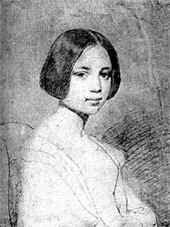





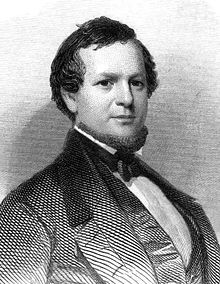






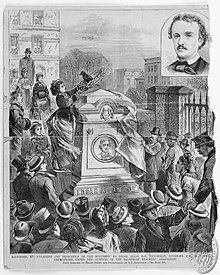
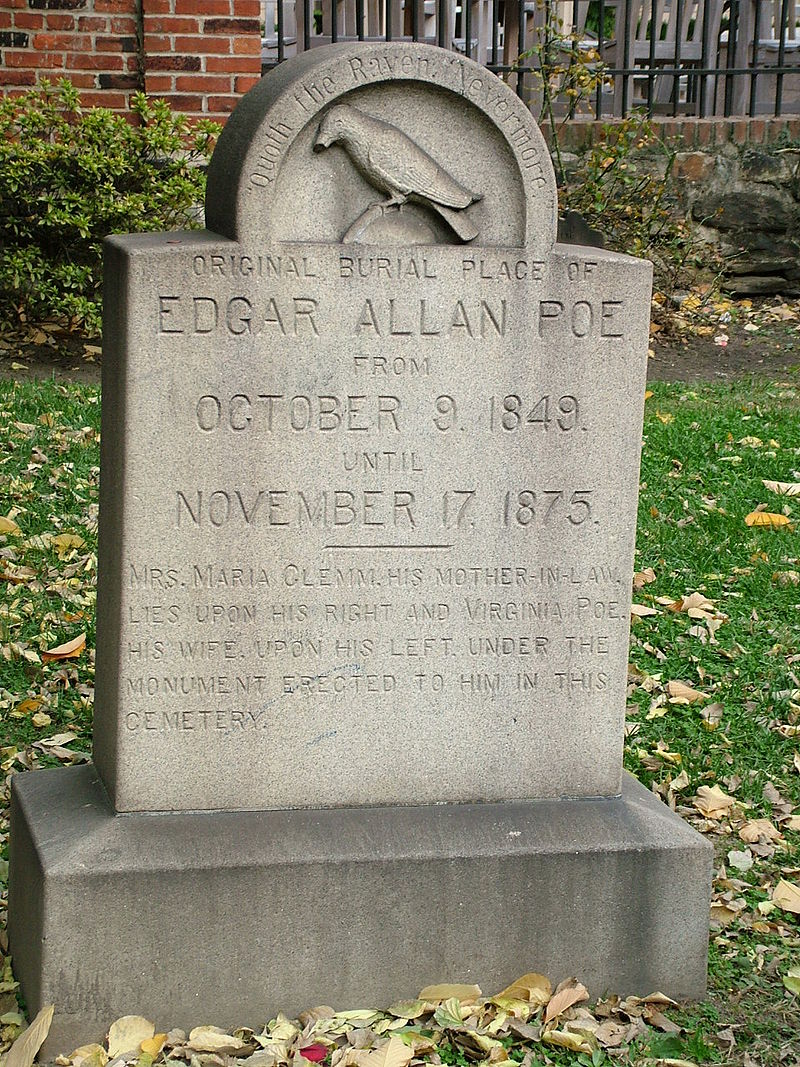
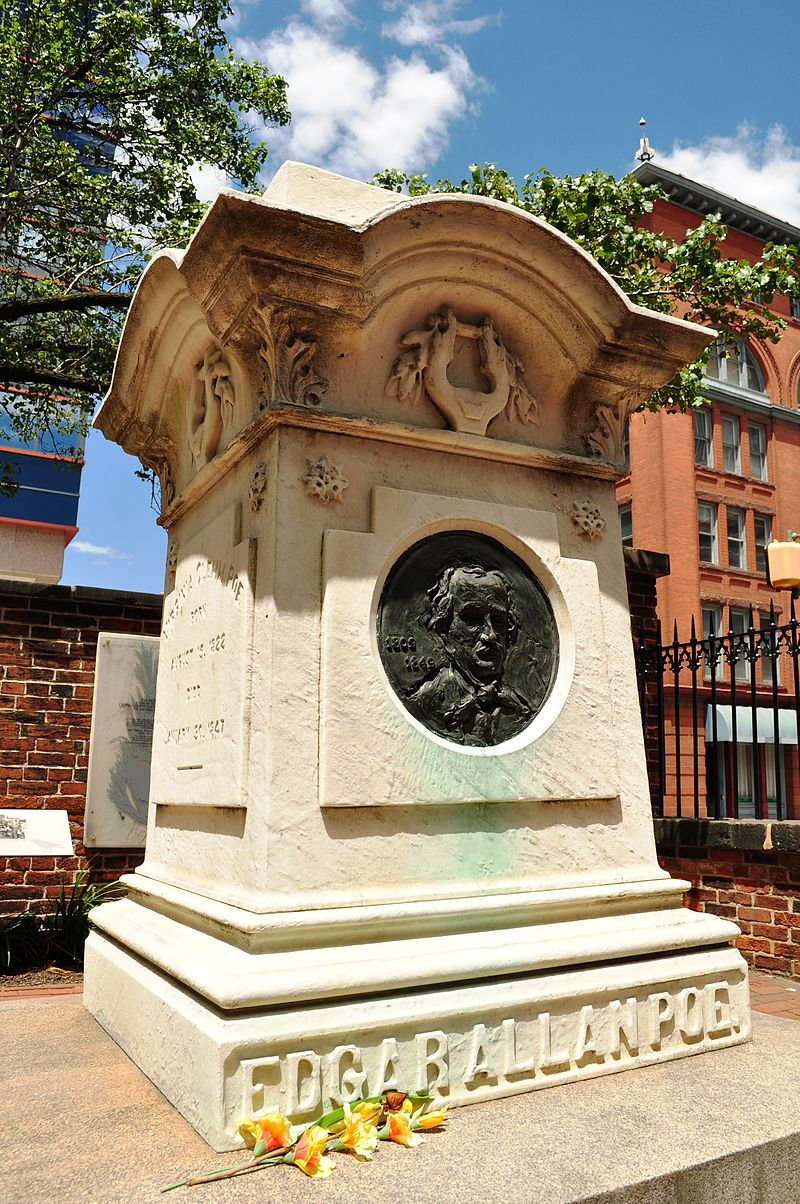
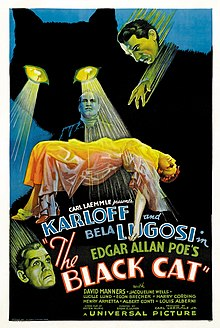
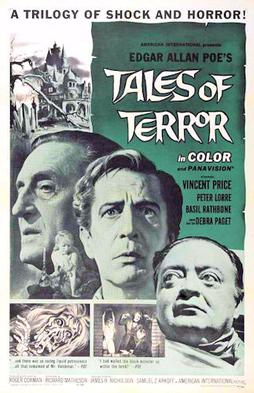


No comments:
Post a Comment